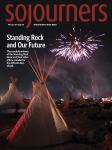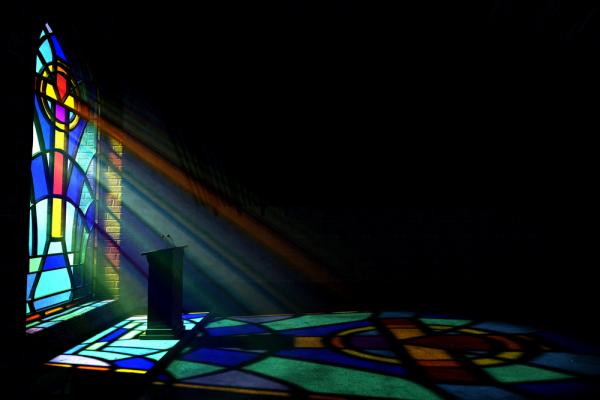THE WORLD INTO WHICH we preachers cast our voices is already the world claimed, sought, and being reclaimed by Christ. For a white preacher to risk talk about race is an act of faith in the transformative resourcefulness of the Trinity. When it comes to the great divine-human contest with our sin, including our sin of racism, God will have the last word: “Come to me” conjoined with “Follow me.”
While preaching can’t do everything, God has chosen preaching as weapon of choice in the divine invasion and reclamation of creation. Theologian Richard Lischer says that Martin Luther King Jr. “believed that the preached Word performs a sustaining function for all who are oppressed, and a corrective function for all who know the truth but lead disordered lives. He also believed that the Word of God possesses the power to change hearts of stone.”
Preaching is one of the means through which God defeats our natural narcissism.
Theology, not anthropology
Much of my church family wallows in the mire of moral, therapeutic deism, a “god” whom the modern world has robbed of all agency. Ta-Nehisi Coates begins his riveting Between the World and Me by announcing that he is an atheist. Between the World and Me is an honest but brutal, sorrowing, eloquent, hopeless lament for the intractability of American racism. Coates castigates those African Americans who speak of hope and forgiveness.
Eschewing metaphysics or any possibility of God, Coates is unable to plumb the depths of racist evil. Coates says that for those like him who “reject divinity,” “there is no arc ... we are night travelers on a great tundra ... the only work that will matter will be the work done by us.” In his despair, Coates is right: Facing racism without God—with no hope but the work “done by us”—is hopeless. Then he equivocates, saying, “Or perhaps not.”
Christians answer to a sacred vocation whereby we must demonstrate to an unbelieving world, by our little lives and in our pitiful churches, that, in spite of us, there is hope because God is able.
As I said in a sermon, Jesus loves us enough to expect of us not only love but also fruit:
On his way to the cross, Jesus pauses to curse a fig tree (Mark 11:12-14). Walking past a fig tree in leaf, he notes that the tree bears no fruit. Mark comments that, “It was not the season for figs.” Refusing to praise the tree’s foliage, Jesus curses the tree. Why curse a tree for having no figs when it’s not the season for fruit? The next day, Jesus and his disciples walked by the fig tree that yesterday Jesus cursed—even though it was not the season for fruit—and yesterday’s healthy tree has withered. If you’re a fig tree, better pray for fruit, because if you are unfruitful (in spite of the season) Jesus will curse.
A district superintendent told me about a church that was, like most United Methodist churches, comprised mostly of older folk. A member’s granddaughter brought a friend with her to church. Her friend was of a different race than everybody else in the congregation. The next week the grandmother received a call from a fellow member of the congregation: “I hope that your granddaughter is not planning to bring her little friend back next Sunday. It’s not that I am prejudiced, it’s just that I am sure the little girl and her family would be happier elsewhere.” The little girl never again visited the church, nor did the grandmother or her granddaughter. They got the message; it’s not the season for harvesting fruit. Less than one year after this event, the superintendent had the melancholy task of reading out that church’s closure. “Jesus is not nice to a church that refuses to be his church,” said the superintendent, shaking her head in sorrow.
My denomination is over 90 percent white. We half-heartedly tried to solve on a general church level the problem of racism that is most effectively addressed within the local congregation. Our bishops issued pronouncements on race rather than encouraging individual pastors to preach on race. Why would Jesus demand fruit from us, even in an age when a conversation about race is “out of season”? He must have enough faith in us to believe that, with his help, we could become fruitful. Lack we faith that Jesus can make us fruitful?
Preachers are not permitted to acquiesce to our racism or that of our congregations because God in Christ has not given up on us. Christ is more than a model for better preaching; he is the unsubstitutable agent of proclamation.
We work not alone. Christ wants us to succeed at our evangelistic task. Our assignment as preachers is to invite, cajole, and to welcome people into “the kingdom he has opened to people of all ages, nations, and races.” Preaching “works” because Jesus Christ, in the power of the Holy Spirit, is determined to get back what belongs to God.
Exorcism
In Resisting the Powers, Chuck Campbell speaks of preaching in the face of powers such as racism as “exorcism”: “Don’t many folks—preachers included—long to be set free from the powers of death that have us in their grip and won’t let us go—powers from which we cannot seem to free ourselves no matter how hard we try? After all, this is the key characteristic of demon possession: We are no longer agents of our own lives, but go through the deadly motions dictated to us by the powers of the world that hold us captive ... we need a word from beyond ourselves to set us free from our captivity.”
The challenge is for us to move beyond being nonracist to being actively anti-racist, always remembering that “We aren’t fighting against human enemies but against rulers, authorities, forces of cosmic darkness, and spiritual powers of evil in the heavens. Therefore, pick up the full armor of God so that you can stand your ground on the evil day and after you have done everything possible to still stand” (Ephesians 6:12-13).
That’s why it’s not enough for us to share our personal story or to exhort the congregation to greater striving for justice. “We don’t preach about ourselves. Instead, we preach about Jesus Christ as Lord” (2 Corinthians 4:5). In Campbell’s words, “We need a word beyond ourselves to set us free.”
When mainline Protestant preachers succumbed to the error of thinking that America was a basically Christian culture, that one became Christian by being fortunate enough to be born in the U.S., there was no need for teaching sermons or for invitation to metanoia (repentance and transformation). Church degenerated into a place we go to bolster our belief that we don’t need metanoia because America is the Kingdom of God. That’s why most preaching in my church family is in the evocation mode—evoking better attitudes and behavior in basically nice people who are urged, in the sermon, to be a bit nicer.
Should we be surprised that a racially accommodated church reduces Christian worship to the cultivation of various sorts of subjectivity and interiority, presenting the Christian faith as a therapeutic technique for acquiring personal, individual meaning and joy in life? A narcissistic faith turns away from the crucified, bodily present Christ who is active here, now, judging the powerful, forgiving sinners, suffering with the oppressed, and rising in defeat of oppression.
Preaching, not therapy
Affluent, self-satisfied folks prefer to be a bit less miserable than saved. Rather than risk sermons that require a dying and rising savior to succeed, we forsake Christ’s mission to the world and content ourselves with mostly therapeutic, interior concerns and psychological advice to help the mildly afflicted white middle class face their anxieties with a positive attitude. Some of the stress and anxiety we are attempting to soothe is brought on by white people realizing that they are losing some of their privilege. Some of the stress and fear may be induced by a righteous God! Jeremiah condemned those false prophets who “heal wounds lightly” rather than preach judgment and repentance (Jeremiah 8:11).
Theologian James Cone asks why white theologians obsess over theodicy, “asking why God permits massive suffering, but they hardly ever mention the horrendous crimes whites have committed against people of color.”
Though therapeutic deism takes the guts out of preaching, thanks be to God, Truth, smothered by therapeutic mush, will rise. Preaching—raising the dead, casting out demons, going head-to-head with the principalities and powers—is a more interesting way to expend one’s life than therapy.
We clergy must acknowledge not only our privilege but our empowerment by God and the people of God, take authority, and use the grace that’s given us, confident that God’s word will not come back empty (Isaiah 55:11).

Got something to say about what you're reading? We value your feedback!

